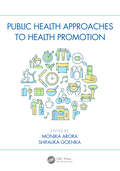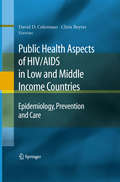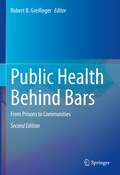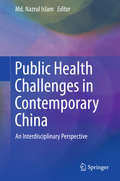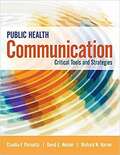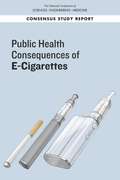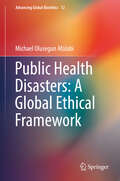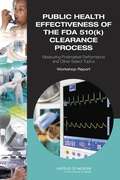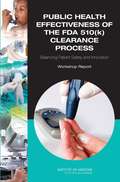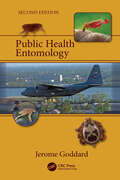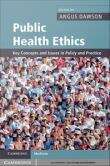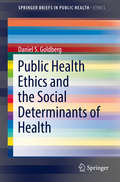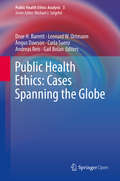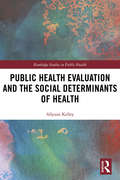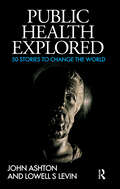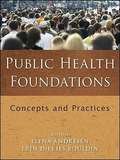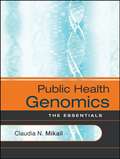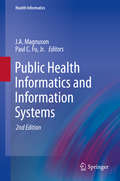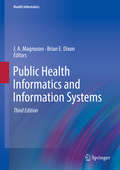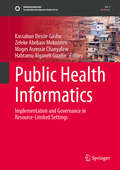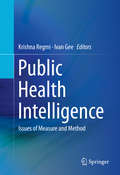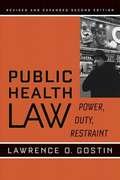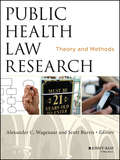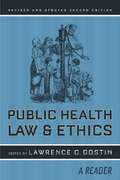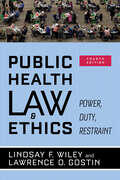- Table View
- List View
Public Health Approaches to Health Promotion (Public Health Approach)
by Monika Arora and Shifalika GoenkaHealthy behaviors, at the individual and community levels, are imperative to improving and sustaining better public health. With a strong focus on prevention, health promotion strategies are crucial to improving quality of life, while taking into account the various determinants of health. This book provides a global perspective, with an emphasis on contextual issues with health promotion in South Asia for understanding challenges and related strategies. Readers will be comprehensively introduced to healthy behaviors through case studies, covering theories, interventions, and approaches to promote healthy behavior, the impact of policy, and how behavior change can be sustained. Key features – • Covers existing and emerging issues in health promotion • Input from globally renowned public health experts with a multidisciplinary approach to content and audience • Connects with health systems and relevant sustainable development goals • Provides case studies for enabling readers to understand and apply evidence-based solutions to key public health issues
Public Health Aspects of HIV/AIDS in Low and Middle Income Countries
by Chris Beyrer David CelentanoIt has now been 25 years since the apocryphal report in the CDC Morbidity and Mortality Weekly Report dated June 5, 1981 entitled, "Pneumocystis Pneumonia - Los Angeles", which announced what was to become HIV/AIDS. HIV has now affected virtually all countries that have looked for it and has had a devastating impact on the public health and medical care infrastructure around the world. HIV/AIDS has also disproportionately affected nations with the least capacity to confront it, especially the developing world nations in Sub-Saharan Africa, South and Southeast Asia, and the emerging republics of Eastern and Central Asia. The pandemic, unlike any other disease of our time, has had profound impacts on the practice of public health itself: bringing affected communities into decision making; demanding North-South partnerships and collaborations; and changing the basic conduct of clinical and prevention trials research. While much has been written in scholarly publications for medical, epidemiologic and disease control specialists, there is no comprehensive review of the public health impact and response to HIV/AIDS in the developing world. This edited volume seeks to systematically describe the emergence and form of the epidemics (epidemiology), the social, community and political response, and the various measures to confront and control the epidemic, with varying levels of success. Of particular importance are strategies that appear to have been useful in ameliorating the epidemic, while contrasting the situation in a neighboring country or region where contrasting prevention or care initiatives have had a deleterious outcome. Common to all responses has been the international multi-sectoral response represented by the Global Fund for HIV/AIDS, Malaria and Tuberculosis, the President's Emergency Plan for AIDS Relief, and the Gates Foundation, among others, to promote HIV pharmacologic therapy in resource-poor settings. The chapter authors will explore the political challenges in meeting HIV/AIDS prevention and care in concert with the public health realities in specific country and regional context.
Public Health Behind Bars: From Prisons to Communities
by Robert B. GreifingerPublic Health Behind Bars From Prisons to Communities examines the burden of illness in the growing prison population, and analyzes the impact on public health as prisoners are released. This book makes a timely case for correctional health care that is humane for those incarcerated and beneficial to the communities they reenter.
Public Health Challenges in Contemporary China
by Md. Nazrul IslamThis book addresses contemporary public health challenges in China from an interdisciplinary perspective. These challenges include health service system, population ageing, food safety, substance abuse and its prevention and treatment, Buddhist delivery of elderly care, the development of professional healthcare social work, and the integration of Chinese Medicine in public health. The book brings together top-notch scholars, academics and professionals in each of these research areas to explore and reveal the complex and challenging task of addressing health-related issues in China.
Public Health Communication Critical Tools and Strategies
by Claudia Parvanta Richard N. Harner David E. NelsonDesigned for master’s level study, Public Health Communication: Critical Tools and Strategies for Advancing Public Health will prepare new graduates for any entry level position in public health policy/advocacy, health communication, health promotion, social marketing, or community health education. Filled with practical examples, the book is also a valuable resource for those preparing for the CPH or CHES exams. Students will learn core concepts for planning a communication framework as well key strategies for educating the public about health issues including understanding and reporting science, communicating for policy and advocacy, and health literacy and numeracy. The book thoroughly explores classic theories of persuasion in communication such as Extended Parallel Process Model, Inoculation, Sensation Value, and Cognitive Value. The most current forms of digital/multimedia/interactive channels of communication are examined. The last section of the book looks at some special contexts in health communication, such as patient-provider communication as well as risk/emergency communication.
Public Health Consequences of E-Cigarettes
by Engineering Medicine National Academies of SciencesMillions of Americans use e-cigarettes. Despite their popularity, little is known about their health effects. Some suggest that e-cigarettes likely confer lower risk compared to combustible tobacco cigarettes, because they do not expose users to toxicants produced through combustion. Proponents of e-cigarette use also tout the potential benefits of e-cigarettes as devices that could help combustible tobacco cigarette smokers to quit and thereby reduce tobacco-related health risks. Others are concerned about the exposure to potentially toxic substances contained in e-cigarette emissions, especially in individuals who have never used tobacco products such as youth and young adults. Given their relatively recent introduction, there has been little time for a scientific body of evidence to develop on the health effects of e-cigarettes. Public Health Consequences of E-Cigarettes reviews and critically assesses the state of the emerging evidence about e-cigarettes and health. This report makes recommendations for the improvement of this research and highlights gaps that are a priority for future research.
Public Health Disasters: A Global Ethical Framework (Advancing Global Bioethics #12)
by Michael Olusegun AfolabiThis book presents the first critical examination of the overlapping ethical, sociocultural, and policy-related issues surrounding disasters, global bioethics, and public health ethics. These issues are elucidated under the conceptual rubric: Public health disasters (PHDs). The book defines PHDs as public health issues with devastating social consequences, the attendant public health impacts of natural or man-made disasters, and latent or low prevalence public health issues with the potential to rapidly acquire pandemic capacities. This notion is illustrated using Ebola and pandemic influenza outbreaks, atypical drug-resistant tuberculosis, and the health emergencies of earthquakes as focal points. Drawing on an approach that reckons with microbial, existential, and anthropological realities; the book develops a relational-based global ethical framework that can help address the local, anthropological, ecological, and transnational dynamics of the ethical issues engendered by public health disasters. The book also charts some of the critical roles that relevant local and transnational stakeholders may play in translating the proposed global ethical framework from the sphere of concept to the arena of action. This title is of immense benefit to bioethics scholars, public and global health policy experts, as well as graduate students working in the area of global health, public health ethics, and disaster bioethics.
Public Health Effectiveness of the FDA 510(K) Clearance Process: Measuring Postmarket Performance and Other Select Topics - Workshop Report
by Institute of Medicine of the National AcademiesThe Food and Drug Administration (FDA) is responsible for ensuring that medical devices are safe and effective before they go on the market. As part of its assessment of the FDA's premarket clearance process for medical devices, the IOM held a workshop on July 28 to discuss how medical devices are monitored for safety after they are available to consumers. This document summarizes the workshop.
Public Health Effectiveness of the Fda 510(K) Clearance Process: Balancing Patient Safety and Innovation
by Institute of Medicine of the National AcademiesThe Food and Drug Administration (FDA) is responsible for assuring that medical devices are safe and effective before they go on the market. As part of its assessment of FDA's premarket clearance process for medical devices, the IOM held a workshop June 14-15 to discuss how to best balance patient safety and technological innovation. This document summarizes the workshop.
Public Health Entomology
by Jerome GoddardIn the struggle against vector-borne diseases, it is critical that we bridge the gap among vector control workers on the ground (practitioners), public health planners and administrators, and (academic) medical entomologists. This second edition of Public Health Entomology is designed to fit certificate courses in public health entomology offered by universities and U.S. Centers of Excellence. It comprehensively examines vector-borne disease prevention, surveillance, and control from a governmental and public health perspective with worldwide application.Divided into two sections, the book begins with a historical account of the early beginnings of pest control and public health. Next, it outlines the concepts, design, and implementation of a sound public health entomology program, including issues associated with pesticide use, FEMA and other disaster response entities, and an adverse, chemophobic public. The second section provides an overview of some of the most common public health pests that are found globally. Copious photos and line drawings accentuate the text, along with text boxes and sidebars. The new edition addresses "IPM and Alternative Control Methods" in each section, expands the Lyme disease section, and includes other new and emerging tick-borne diseases (TBD). It provides enhanced discussion of working with local political figures and jurisdictions, as well as partnerships with academia, and is generally more worldwide in scope. Author Jerome Goddard designed and implemented the vector control program along the Mississippi Gulf Coast after Hurricane Katrina. His ability to communicate his knowledge and experience to public health students, professionals, and the general public make this book an essential resource for preventing disease from these vector-borne threats.
Public Health Ethics
by Angus DawsonIn twelve original papers notable ethicists explore various issues raised by public health practice - an area that has received scant attention in published literature. They use the resources of ethical theory to illuminate important theoretical and practical topics, including the nature of public health, notions of community, population bioethics, the legitimate role of law, the use of cost-effectiveness as a methodology, screening, smoking policies,vaccinations, and the nature of infectious disease.
Public Health Ethics and the Social Determinants of Health (SpringerBriefs in Public Health)
by Daniel S. GoldbergThis progressive resource places concepts of social determinants of health in the larger contexts of contemporary health ethics and the evolution of social reform. It provides needed analysis of the larger causes behind the immediate causes of illness and epidemics, particularly injustice, systemic inequities, and the cumulative effect of compound disadvantages. This moral approach to collective and individual responsibilities—on the part of practitioners as well as the public—supports a sound blueprint for finding answers to longstanding global and local concerns. Readers are challenged to recognize the critical role of social determinants to their perception of health issues, controversies, and possibilities as the book:· Details the epidemiologic evidence regarding social determinants of health. · Key ethical implications of the evidence regarding social determinants of health. · Considers the role of risky health behaviors in determining population health outcomes. · Addresses ethical questions of priority-setting at the policy and practice levels. · Translates social determinants of health into health policy goals. Half textbook, half monograph, Public Health Ethics and the Social Determinants of Health Is geared toward students in MPH programs as well as public health professionals in diverse contexts such as local health departments and non-profit organizations. It informs public health scientists and scholars, and can also serve as an introductory text for students in public health ethics, or as part of a general applied ethics course.
Public Health Ethics: Cases Spanning the Globe
by Angus Dawson Drue H. Barrett Leonard H. Ortmann Carla Saenz Andreas Reis Gail BolanThis Open Access book highlights the ethical issues and dilemmas that arise in the practice of public health. It is also a tool to support instruction, debate, and dialogue regarding public health ethics. Although the practice of public health has always included consideration of ethical issues, the field of public health ethics as a discipline is a relatively new and emerging area. There are few practical training resources for public health practitioners, especially resources which include discussion of realistic cases which are likely to arise in the practice of public health. This work discusses these issues on a case to case basis and helps create awareness and understanding of the ethics of public health care. The main audience for the casebook is public health practitioners, including front-line workers, field epidemiology trainers and trainees, managers, planners, and decision makers who have an interest in learning about how to integrate ethical analysis into their day to day public health practice. The casebook is also useful to schools of public health and public health students as well as to academic ethicists who can use the book to teach public health ethics and distinguish it from clinical and research ethics.
Public Health Evaluation and the Social Determinants of Health
by Allyson KelleyCompelling evidence shows health disparities are the result of inequalities in income, education, limited access to medical care, substandard social environments, and poor economic conditions. This book introduces these social determinants of health (SDOH), discusses how they relate to public health programs, and explains how to design and evaluate interventions bearing them in mind. Arguing that many public health programs fail to be as effective as they could be, because they ignore the underlying causes of health disparities, this important reference gives concrete examples of how evaluations focusing on the social determinants of health can alleviate health inequalities, as well as step-by-step guidance to undertaking them. This resource blends current research, existing data, and participatory evaluation methods. It is designed for teachers, students, practitioners, and policymakers interested in public health programming and evaluation.
Public Health Explored: 50 Stories to Change the World
by John AshtonAn understanding of public health has never been more important!There has been a growing interest in public health, driven by concerns for social justice and sustainability, but it is currently in the headlines as never before. The failure of governments to get to grips with the Covid-19 pandemic has demonstrated widespread ignorance of the basics of a public health approach to threats to health and well-being.Relevant to all interested individuals but particularly students and professionals within nursing, medicine, social work and public health, this book encourages critical debate and reflection to develop a deep understanding of the complexities of public health issues. It offers 50 powerful stories and sayings around public health that could just change the world! Accompanied by searching questions for discussion and case studies that provide context and link each aphorism to a key event or theme, important messages around public health are extracted and explored.
Public Health Foundations: Concepts and Practices
by Elena Andresen Erin Defries BouldinResponding to the growing interest in public health, Public Health Foundations is an accessible and comprehensive text that offers a reader-friendly introduction to core concepts and current practices. The authors use an engaging approach to topics such as epidemiology and pharmacoepidemiology, biostatistics, infectious disease, environmental health, social and behavioral sciences, health services and policy, quantitative and qualitative research methods, and health disparities. Ready for the classroom, each chapter includes learning objectives, an overview, detailed explanations, case studies, a summary, key terms, and review questions. Sidebars connect students to topics of current interest in the field of public health, including ethics, emerging and reemerging infectious diseases, environmental hazards, climate change, social justice, and issues of insurance and access to health care. Reflecting and expanding on recommendations of the Association of American Colleges and Universities, Public Health Foundations provides a solid framework for understanding the basics of public health and is the ideal text for a wide range of courses in public health. Companion Web site: josseybass. com/go/andresen
Public Health Genomics
by Claudia N. MikailThe Centers for Disease Control (CDC) has recognized genomics as a priority area in public health education. To help public health students and professionals achieve proficiency in the language of genetics and attain genomics competencies delineated by the CDC, this book offers an introduction to basic molecular genetics and discusses the relevance of genomics to such key public health issues as environmental health, ethnic health disparities, health policy and law, research ethics, maternal and child health, clinical preventive medicine, health behavior, health economics, and communicable disease control. Presented in a context that is easy to understand, the book serves as an accessible portal of entry into the world of public health genomics.
Public Health Informatics and Information Systems
by Jr. J. A. Magnuson Paul C. FuThis revised edition covers all aspects of public health informatics and discusses the creation and management of an information technology infrastructure that is essential in linking state and local organizations in their efforts to gather data for the surveillance and prevention. Public health officials will have to understand basic principles of information resource management in order to make the appropriate technology choices that will guide the future of their organizations. Public health continues to be at the forefront of modern medicine, given the importance of implementing a population-based health approach and to addressing chronic health conditions. This book provides informatics principles and examples of practice in a public health context. In doing so, it clarifies the ways in which newer information technologies will improve individual and community health status. This book's primary purpose is to consolidate key information and promote a strategic approach to information systems and development, making it a resource for use by faculty and students of public health, as well as the practicing public health professional. Chapter highlights include: The Governmental and Legislative Context of Informatics; Assessing the Value of Information Systems; Ethics, Information Technology, and Public Health; and Privacy, Confidentiality, and Security. Review questions are featured at the end of every chapter. Aside from its use for public health professionals, the book will be used by schools of public health, clinical and public health nurses and students, schools of social work, allied health, and environmental sciences.
Public Health Informatics and Information Systems (Health Informatics)
by Brian E. Dixon J. A. MagnusonThis 3rd edition of a classic textbook examines the context and background of public health informatics, explores the technology and science underlying the field, discusses challenges and emerging solutions, reviews many key public health information systems, and includes practical, case-based studies to guide the reader through the topic. The editors have expanded the text into new areas that have become important since publication of the previous two editions due to changing technologies and needs in the field, as well as updating and augmenting much of the core content. The book contains learning objectives, overviews, future directions, and review questions to assist readers to engage with this vast topic. The Editors and their team of well-known contributors have built upon the foundation established by the previous editions to provide the reader with a comprehensive and forward-looking review of public health informatics.The breadth of material in Public Health Informatics and Information Systems, 3rd edition makes it suitable for both undergraduate and graduate coursework in public health informatics, enabling instructors to select chapters that best fit their students’ needs.
Public Health Informatics: Implementation and Governance in Resource-Limited Settings (Sustainable Development Goals Series)
by Kassahun Dessie Gashu Zeleke Abebaw Mekonnen Moges Asressie Chanyalew Habtamu Alganeh GuadieDigital health is becoming a key solution to improve access and quality healthcare delivery through overcompensating geographical barriers and facilitating evidence-based decision-making. Big data, artificial intelligence, the Internet of Things, machine learning and other technologies are playing an enormous role in the advancement of public health. Public health informatics is an emerging concept becoming to improve access and quality as well as reduce catastrophic health expenditure.Public Health Informatics: Implementation and Governance in Resource-Limited Settings is designed to provide insight for public health practitioners, technologists and healthcare workers to the use of digital technologies in public health especially those based in otherwise resource-limited settings. It is therefore vital reading for stakeholders who strive to set policy, guidelines and establish infrastructures to reduce the digital-divide in healthcare delivery.
Public Health Intelligence
by Krishna Regmi Ivan GeeThe first textbook on public health intelligence presents indepth the key concepts, methods, and objectives of this increasingly importantcompetency. It systematically reviews types of evidence and data that compriseintelligence, effective techniques for assessment, analysis, andinterpretation, and the role of this knowledge in quality health service delivery. The book's learner-centered approach gives readers interactive context formastering the processes of gathering and working with intelligence as well asits uses in informing public health decision-making. And its pragmaticframework will help establish standards for training, practice, and policy,leading to continued improvements in population health. This path-breaking resource: Offers a comprehensive, up-to-date introduction to public health intelligence, a core area of public health competency. Is suitable for both graduates' and healthcare professionals' training and development for national and international contexts. Helps readers apply theory to real-life scenarios, from multi-professional perspectives. Features activities, case studies, and discussion tasks for easy reader engagement. Anticipates and examines emerging developments in the field. Public HealthIntelligence - Issues of Measure and Method is bedrock reading for postgraduateand advanced undergraduate students in public health, global health, healthpolicy, health service management, nursing, medicine, statistics, epidemiology,quantitative methods, health intelligence, health inequality, and other alliedhealthcare fields. It is also a salient text for public health practitionersand health policymakers. "This bookis a 'must-read' for students contemplating a career in Public Health or foranyone who is already in practice. The breadth of chapters from respectedauthors provide a detailed overview and critique of issues related to publichealth intelligence. A key strength of the book is that it is written with bothstudents and practitioners in mind. " GurchRandhawa, PhD, FFPH, Professor of Diversity in Public Health & Director,Institute for Health Research, University of Bedfordshire, UK
Public Health Law
by Lawrence O. GostinPublic Health Law, first published in 2000, has been widely acclaimed as the definitive statement on public health law at the start of the twenty-first century. Lawrence O. Gostin's definition was based on the notion that government bears a responsibility for advancing the health and well-being of the general population, and the book developed a rich understanding of the government's powers and duties while showing law to be an effective tool in the realization of a healthier and safer population. In this second edition, Gostin analyzes the major health threats of our times, from emerging infectious diseases and bioterrorism to chronic diseases caused by obesity.
Public Health Law Research
by Scott C. Burris Alexander C. WagenaarPublic Health Law Research: Theory and Methods definitively explores the mechanisms, theories and models central to public health law research - a growing field dedicated to measuring and studying law as a central means for advancing public health.Editors Alexander C. Wagenaar and Scott Burris outline integrated theory drawn from numerous disciplines in the social and behavioral sciences; specific mechanisms of legal effect and guidelines for collecting and coding empirical datasets of statutory and case law; optimal research designs for randomized trials and natural experiments for public health law evaluation; and methods for qualitative and cost-benefit studies of law.. They also discuss the challenge of effectively translating the results of scientific evaluations into public health laws and highlight the impact of this growing field."How exactly the law can best be used as a tool for protecting and enhancing the public's health has long been the subject of solely opinion and anecdote. Enter Public Health Law Research, a discipline designed to bring the bright light of science to the relationships between law and health. This book is a giant step forward in illuminating that subject." -- Stephen Teret, JD, MPH, Professor, Director, Center for Law and the Public's Health, Johns Hopkins Bloomberg School of Public Health"Wagenaar and Burris bring a dose of much needed rigor to the empirical study of which public health law interventions really matter, and which don't." -- Bernard S. Black, JD, Chabraja Professor, Northwestern University Law School and Kellogg School of ManagementCompanion Web site: www.josseybass.com/go/wagenaar
Public Health Law and Ethics: Power, Duty, Restraint
by Lawrence O. Gostin Lindsay F. WileyPublic Health Law and Ethics defines these fields for a new generation. This bold and updated edition probes how the Covid-19 pandemic has fundamentally changed the legal landscape for public health practice. Through incisive analysis of public health legislation, judicial opinions, and scholarly research, this accessible primer articulates the scope and limits of governmental powers and duties to protect the public's health, builds a case for why social justice must be prioritized as a core value of public health ethics, examines the role of the courts in striking down democratically enacted laws, and covers today’s most pressing health issues, such as chronic diseases, opioid overdoses, gun violence, disability rights, sexual and reproductive autonomy, and racial and gender equity. The book creates a framework for ensuring public health interventions are based on sound scientific evidence and consistent with ethical values, revealing complex answers to the essential question of what community members owe one another when it comes to health.
